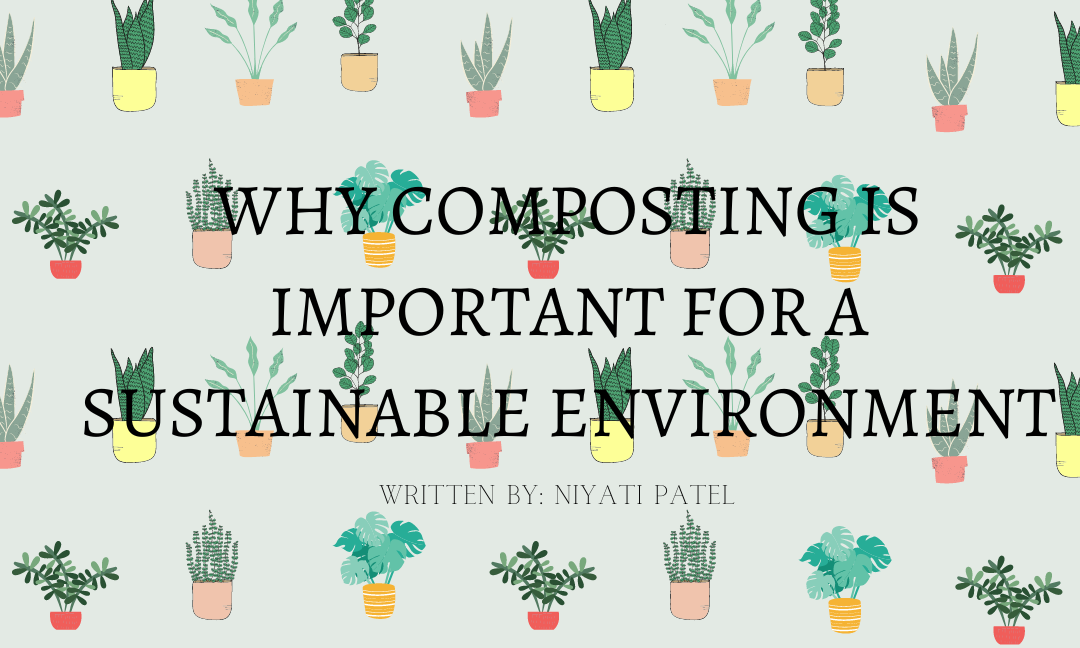Written by: Niyati Patel
Edited by: Advita G.
Designed by: Jiya Mehta
Published by: Rayna Almas
As the world’s population increases and as the world evolves, the need for a sustainable environment increases. As more humans produce more waste –both food waste and fecal waste – we simply cannot just pile the waste on top of each other and expect the Earth to function in the same way. As the world’s population grows, composting grows just as important as it recycles organic waste and other biodegradable products.

What is Composting and Where is it Done?
Composting is an aerobic process in which organic matter is decomposed in an environmentally friendly way. Organic matter is usually kitchen scraps such as fruit and vegetable peels and egg shells. However, organic matter can also be natural sources such as dried leaves that can be found outside. Composting can be done anywhere! Usually people use buckets filled with soil to compost. Composting is very simple and easy not to mention that it is very environmentally friendly!
How is Composting Done?
Composting requires only 4 things:
- Soil
- Water
- Oxygen
- Organic matter
When these four things are present, soil, water and organic matter react in the presence of oxygen to create compost. This happens because the microorganisms found in soil eat biodegradable waste and break it down into very simple matter. Microorganisms break down the material through aerobic respiration–-while using oxygen or in the presence of oxygen gas. This produces nitrogen, phosphorus and potassium.
Why is Composting so Beneficial?
Composting is very beneficial as it recycles biodegradable matter and adds to the richness of the soil. This reduces the need for farmers to use pesticides and fertilizers. When farmers don’t use these chemicals they don’t make their way into our food and then into our systems. This is beneficial for cost reduction and inflation especially in today’s market. It is also very beneficial for our human body.
How is it different from landfills?
Many people wonder that if we are burying kitchen scraps in soil what is the difference between it being in the landfill. The major difference is that the kitchen scraps and organic matter in the landfills are in garbage bags and are under loads of other waste. Therefore, the sunlight and oxygen that needs to reach it is not reached and therefore the waste does not decompose. This causes the release of methane due to anaerobic decomposition which then contributes to global warming.
However, composting is different because it generates much less methane. It also creates rich and fertile soil that can be used for a variety of purposes such as gardening.
To sum it all up, composting is vital for a sustainable environment, so encourage your neighbors to compost so we can all contribute to retaining a healthy world!
Citations:
Ishola, T. M., & Ishola, E. T. (2019). Composting and Sustainable Development. Encyclopedia of Sustainability in Higher Education, 1–8. https://doi.org/10.1007/978-3-319-63951-2_122-1
Beauchemin, M. (2015, June 29). Composting: Good For Your Garden, Bad For Our Landfills. Garden Collage Magazine. https://gardencollage.com/change/sustainability/composting-good-for-your-garden-bad-for-our-landfills/#:~:text=Food%20waste%20contributes%20to%20methane
Freudenrich, C., & Hall-Geisler, K. (2001, April 2). How Composting Works. HowStuffWorks. https://home.howstuffworks.com/composting.htm#:~:text=During%20composting%2C%20microorganisms%20eat%20the

